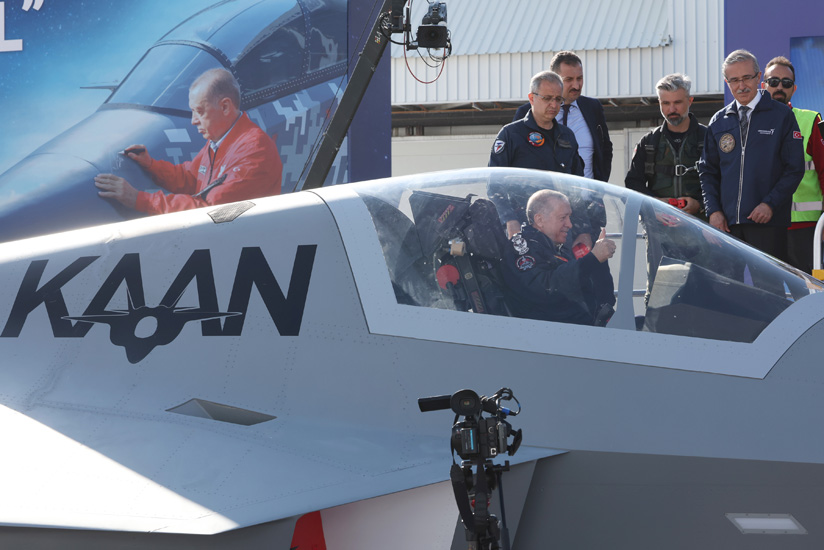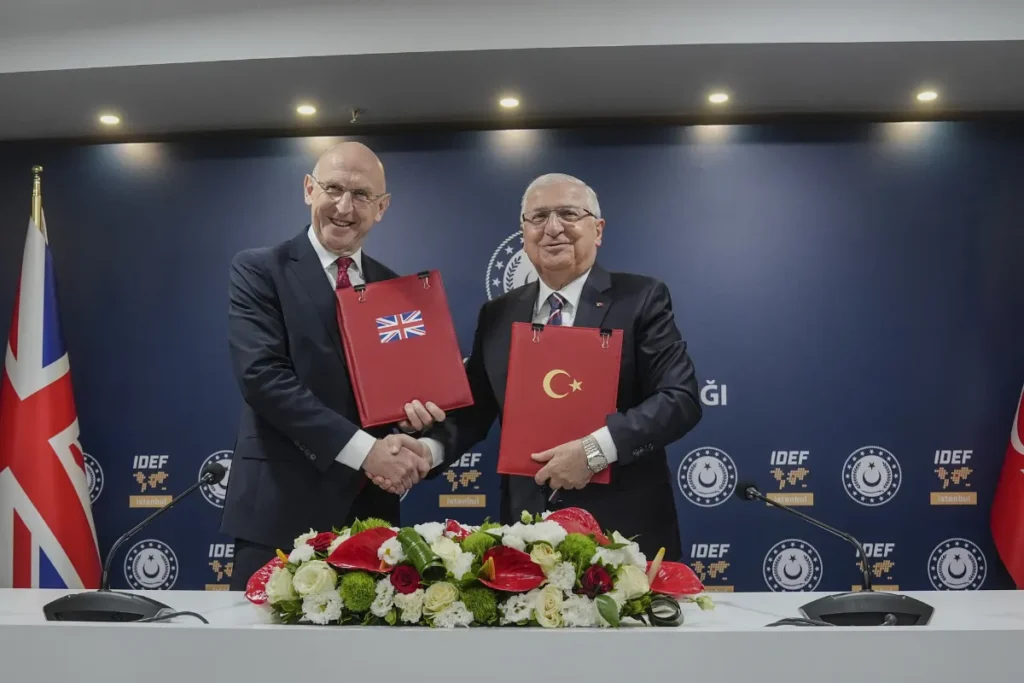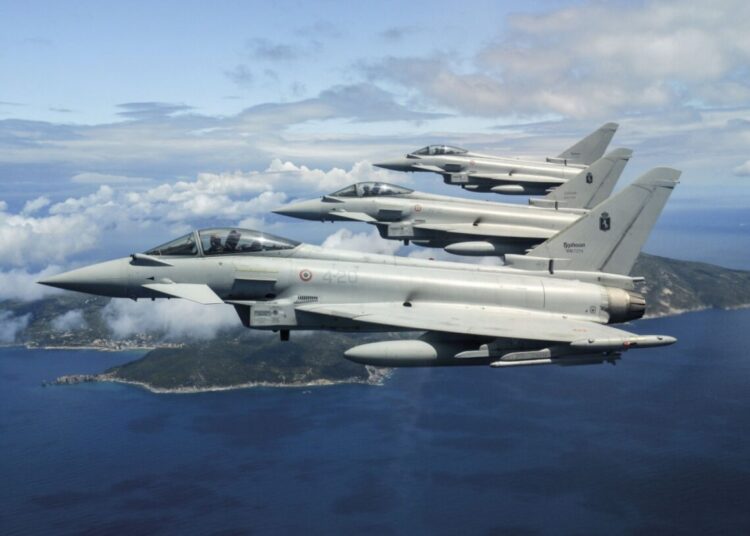Levent Kenez/Stockholm
A government-funded think tank closely aligned with President Recep Tayyip Erdogan has urged Turkey to rapidly enhance its air force to counter what it calls simultaneous threats from Israel and Greece.
Turkey “must acquire sufficient quantitative and qualitative air, air-defense and space capabilities against two simultaneous threats with external backing, Israel and Greece,” according to a new report released by the SETA Foundation, which has ties to Turkish intelligence. The report, authored by defense analyst Murat Aslan, paints a stark picture of Turkey’s current air force capabilities, warning that the country risks falling behind its regional rivals if it does not modernize and expand its fleet of fighter jets.
The report argues that Israel and Greece, both backed by Western defense alliances and advanced military technology, have gained a strategic edge that could undermine Turkey’s security interests. SETA’s analysis emphasizes that Ankara’s current fleet of F-16s, the backbone of its air force since the 1980s, is approaching the end of its operational life. “Turkey cannot afford to rely on aging systems when faced with opponents that possess fifth-generation fighter jets and integrated defense networks,” the report states. It calls for the urgent procurement of new fighter aircraft along wth investments in domestic programs to maintain deterrence and strategic independence.
SETA’s report:
The report comes just a week after Turkey signed a preliminary agreement for the purchase of Eurofighter Typhoon jets. The deal is viewed as a critical step in filling the gap left by Turkey’s removal from the F-35 joint strike fighter program following its controversial purchase of Russian S-400 air defense systems. The acquisition of the S-400s triggered a crisis with Washington and NATO allies, who argued that the Russian system could compromise the stealth capabilities of the F-35. As a result, Turkey was expelled from the program in 2019 despite having paid for some of the jets. SETA’s analysis suggests that re-entry into the F-35 program would “restore Turkey’s qualitative advantage” but acknowledges that the Eurofighter deal is a necessary interim measure.
In its evaluation of regional dynamics, the think tank singles out Greece and Israel as key benchmarks for Turkey’s air capabilities. Greece has been modernizing its F-16 fleet to the advanced F-16V standard while also strengthening defense ties with France and the United States. Israel, meanwhile, operates a mix of F-15I and F-35I Adir fighters with more than 36 of the stealth aircraft already in active service. “These nations have leveraged Western alliances to build air forces that can project power in ways Turkey must be prepared to counter,” the report warns. It stresses that Turkey’s goal should be to build a fleet capable of sustaining operations on multiple fronts with a minimum inventory of 500 combat-ready aircraft.

Turkey’s current fleet consists of approximately 235 F-16C/D Block 30/40/50+ aircraft, many of which have undergone modernization under the OZGUR program, which integrates domestically developed radar, sensors and stand-off munitions, extending the operational life of the jets. However, SETA emphasizes that modernization alone will not suffice. “Even with upgrades, the structural lifespan of many F-16s is limited. A new generation of fighters must be acquired to maintain air superiority,” the report states. Defense Minister Yasar Guler recently confirmed that Turkey will purchase 40 new F-16 Block 70 Vipers but will forego 79 previously planned modernization kits, indicating a shift toward acquiring newer platforms rather than upgrading aging airframes.
The report puts significant emphasis on the Eurofighter Typhoon, highlighting its high-altitude performance and air superiority role. “If Eurofighter procurement fails, Turkey must seek an alternative fighter in the range of 40 to 50 aircraft to address urgent combat needs,” it says. The report also suggests that the indigenous KAAN fighter jet, under development by Turkish Aerospace Industries, could play a transformative role after its expected entry into service post-2028. KAAN is envisioned as a fifth-generation fighter with future capabilities that could rival or complement the F-35, including stealth features and integration with AI-driven drones such as ANKA-3 and Kizilelma.
SETA’s recommendations extend beyond fighter jet procurement. It calls for comprehensive upgrades to Turkey’s air-defense and radar systems, particularly to counter stealth aircraft. The integration of advanced AESA radar, electronic warfare systems and domestically developed munitions is described as critical to achieving self-sufficiency and reducing dependence on foreign suppliers. “Turkey must be able to defend itself, deter aggression and if necessary strike adversaries without relying on external permissions or facing embargoes,” the report states.

SETA’s analysis ties these military needs directly to geopolitical realities in the eastern Mediterranean and the Middle East. It points to Greece’s growing defense collaboration with Israel, the United States and the European Union as developments that could isolate Turkey if left unchecked. “The combined air capabilities of Greece and Israel, supported by Western powers, present a dual challenge that Turkey must prepare for,” it warns. The report argues that this dual challenge requires a holistic approach combining foreign procurement with domestic innovation.
Turkey’s troubled relationship with the F-35 program remains a central theme. Ankara’s removal from the program not only delayed its access to fifth-generation stealth technology but also complicated its broader defense strategy. The report notes that if the dispute with Washington is resolved, the delivery of already-paid-for F-35 aircraft would provide an immediate qualitative edge. Until then, Eurofighters and modernized F-16s will need to bridge the gap. “The strategic value of the F-35 cannot be ignored, but Turkey must not remain dependent on a single supplier or be vulnerable to political conditions,” it says.
The report underscores that air superiority is essential for Turkey to maintain regional influence and respond to crises. It recalls past operations such as Turkey’s intervention in Libya in 2019-2020 as evidence that long-range and high-altitude air capabilities are decisive in modern conflicts. Without these, the report warns, Turkey risks losing the initiative in potential future confrontations.
In its concluding section, SETA calls for a multifaceted approach to air power. It recommends accelerating the KAAN program, acquiring Eurofighters as a stopgap measure and investing heavily in unmanned aerial vehicles and stealth technologies. The report also points to the need to integrate artificial intelligence into air combat and surveillance operations, suggesting that the future of warfare will depend on networked platforms rather than standalone aircraft.












